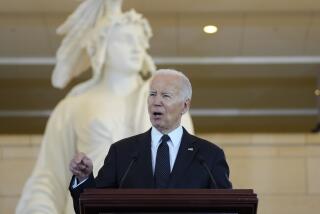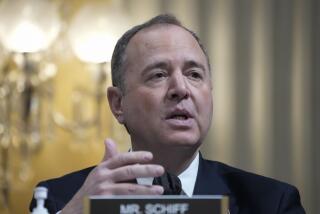House Pushes to Adopt Hate Crime Bill
- Share via
WASHINGTON — House Republicans on Wednesday acted to defuse what could be a politically damaging issue, instructing House negotiators to extend new protections to homosexuals and the disabled in the punishment of hate crimes.
The move came just hours after a somber President Clinton, flanked by a hate crime investigator and the widow of a victim of racial hatred, appealed to GOP House members to set aside qualms about the measure, passed in July by the Senate.
In pointed language, Clinton challenged the arguments made by many House Republicans and by presidential nominee George W. Bush, who have suggested that such new protections are unnecessary, as states should prosecute all violent crimes with equal vigor.
“It is not true that hate crimes are like other crimes,” Clinton said. “And it is not true that every crime is a hate crime.” Calling crimes motivated by hatred “an even more dangerous kind of infection” than other acts of violence, Clinton said that only Congress can provide the tools to stop its spread.
Voting 232 to 192, the House urged its negotiators to adopt the Senate’s version of the hate crime measure when members of the two chambers meet to draft a compromise bill authorizing Defense Department spending for next year. The House motion passed with the support of 41 Republicans, including Brian P. Bilbray of San Diego, Mary Bono of Palm Springs, Elton Gallegly of Simi Valley, Stephen Horn of Long Beach and Steven T. Kuykendall of Rancho Palos Verdes.
Because Wednesday’s vote is nonbinding, House negotiators still could buck the vote and send a bill to the House floor without the new protections sought by Clinton.
The president told an audience Wednesday in the East Room that “this is not a partisan issue” and challenged lawmakers to “send . . . me final hate-crimes legislation before they adjourn for the year.”
But several Republicans, in the House and the Senate, clearly have calculated that there could be a high political price to pay for blocking the Senate hate crime language, which has become a priority for gay and lesbian activists. Before the vote, Rep. Bill McCollum (R-Fla.), long associated with conservative causes but now locked in a tight race for an open Senate seat, expressed his support for the legislation.
If enacted, the measure passed by the Senate would provide the first major expansion of the hate crime law passed in 1968. Prosecutors in every state, including those without hate crime laws of their own, would be able to use a special federal fund, as well as federal law enforcement resources such as crime labs and investigators--to find and prosecute those who commit crimes motivated by hatred. In addition to crimes motivated by racial, ethnic and religious issues, the Senate language--in a significant broadening of the original measure’s scope--also would recognize crimes motivated by hatred of a person’s gender, sexual orientation or disability as covered by the law.
The Senate measure also would provide for federal investigators and prosecutors to assist local law enforcement officials in resolving cases involving hate crimes.
Rep. Lindsey O. Graham (R-S.C.), who opposed the measure and offered substitute language that would have greatly limited its effect, argued Wednesday that federal law enforcement authorities would be empowered to “reach out and grab” cases away from state and local authorities, usurping their authority. And because in many cases state laws provide for the death penalty when federal law does not, Graham predicted that passage of such a hate crime expansion would encourage defendants to “manufacture motives” of hate. In that way, the suspects would be drawn into the federal justice system and, in some cases, spared the death penalty.
Clinton was joined at the White House on Wednesday by Sherialyn Byrdsong, the widow of Ricky Byrdsong, a former Northwestern University basketball coach killed in a 1999 hate-motivated shooting rampage. Laramie, Wyo., police investigator David O’Malley, who handled the 1998 slaying of gay college student Matthew Shepard, also appeared.
More to Read
Get the L.A. Times Politics newsletter
Deeply reported insights into legislation, politics and policy from Sacramento, Washington and beyond. In your inbox twice per week.
You may occasionally receive promotional content from the Los Angeles Times.











